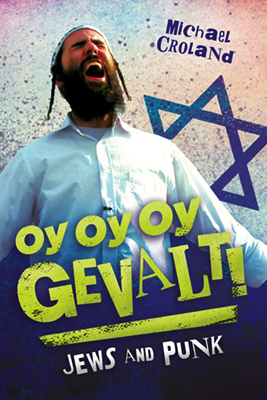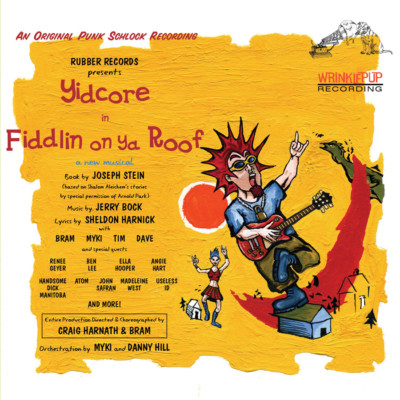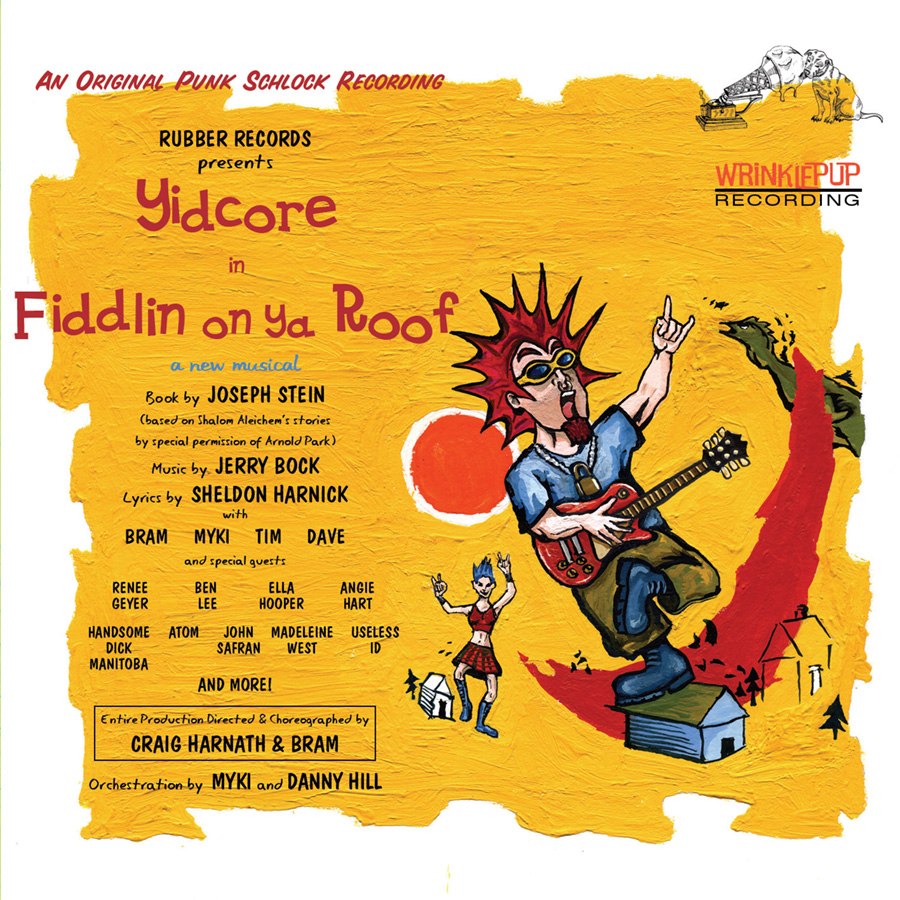
“Punk rock?” your bubbe might say. “Funny, it doesn’t look Jewish.” But according to author Michael Croland, Jews and the punk movement go way back.
In April 2016, Croland published Oy Oy Oy Gevalt! Jews and Punk, a book detailing Jews’ historic role in the punk movement and the ways in which Jewish artists use punk to express Jewish identity.
And it gets better. His journey to the academic study of Jewish punk began in 2005 – with an article he wrote for New Voices.
Read our in-depth interview with Michael Croland below for the full story:
Sara Weissman: First off, give us a little Punk 101. What characterizes punk music?
Michael Croland: Punk can be defined in different ways. It all dates back to music that came out of New York in the 1970s. You have a musical style and basically a subculture of rebellion.
SW: You spent a decade researching the relationship between Jews and the punk movement. What first got you interested in this topic?
MC: In 2005, an Australian Jewish punk band called Yidcore released a punk album covering the full Fiddler on the Roof score. I thought that was the coolest thing, and I hosted a listening party for friends.
I pitched a review of the album to Ilana Sichel, the New Voices editor. My focus at the time was just to review one album. Ilana wrote back that it was an interesting idea and asked if there was a larger context for Jewish punk that I could turn into a feature.
I researched it, and very quickly I realized there was more than enough information for the article to be a feature, which it was in the November/December 2005 issue of New Voices.
SW: Tell me a little bit about the article.
MC: The title of the article was Oy Oy Oy Gevalt: Punks Practice Judaism with Musical Rebellion, and the title of my book is Oy Oy Oy Gevalt! Jews and Punks. So the title itself is almost the same as my book a decade later. It set the template for everything that would follow over the next decade.
The article began by quoting Alicia Jo Rabins. She was in two bands, one of which was called KOSHER. That opening section is in my book and every presentation I do.

To quote it for you, she said, “Playing in KOSHER was a way to say, ‘I have a lip ring and green hair, and I’m also gonna fast on Yom Kippur, and I’m not going to deny either of those things.’”
“I think KOSHER was part of something bigger than us,” she said. “Young American Jews experimenting with different ways the Jewish part of them and the American part of them could interact.”
That right there is what this book is about – how Jewish punk became a vehicle for people to balance their Jewish identity. And it all stems from this one beginning.
[Ilana’s] question led from a review to a feature article, which would’ve been great – dayenu! But it led me on this path that I’m enamored with and identified with, and it led to a book. Our actions have consequences we don’t foresee in life. I’m grateful to New Voices for that.
SW: How did your article finally become a book?
MC: The next step along the way was in late 2006. I found out Yidcore was coming to the U.S. and doing a punk Chanukah tour with a band called Jewdriver. I wound up covering it for The Forward and got to meet a lot of these people. It wasn’t until 2013 that I got a book deal and said, “Ok, this is going to be a book.” In retrospect it seems inevitable, but it was a journey to get here.
SW: In your book, you note that many prominent figures in punk history happen to be Jewish. Why do you think that is? What connects punk and Jewish identity?
MC: I describe nine connections in my book. For one thing, there’s a big emphasis in Judaism on tikkun olam, and there’s a big emphasis on social justice in punk and the punk ethos. I think people from Jewish backgrounds that come to punk see common ground there.
And, for centuries, Jews have used humor as a coping mechanism for the tragedies we’ve experienced. There are at least anecdotal commonalities between that kind of humor and the dark humor found in punk.
There’s also a tradition of Jews being outsiders and marginalized, and punks to a large extent have a marginalized identity both in terms of themselves and sticking up for the little guy in society.
SW: Over the course of your book research, did you discover anything surprising, a finding you didn’t expect?
MC: I’d say one of the greatest challenges was that a lot of the bands talked about the Holocaust in ways that lacked tact. The role of Nazi imagery in punk was shock, negation of meaning, nihilism… It ties into this notion of punk being against the grain, subversive, and rebellious. You have to take it with a grain of salt. But for someone with a strong Jewish education and identity who realizes what the Holocaust meant, it’s hard to take that lightly. I had to find a middle ground to stay true to my values and also cover [these bands] in context. I didn’t want that to be the centerpiece of my book but it certainly came up with numerous examples.
SW: What advice would you give millennial writers?
MC: Write about a lot of topics. Sometimes the best articles are the articles that don’t tie into your interests – something that the editor assigns you or a news-related piece. Try different types of articles. I can’t promise it’ll turn into a book, but it can certainly turn into something more than just an article.
SW: Which Jewish punk artists would you suggest to readers who are new to the Jewish punk scene? (Click to hear some of Croland’s favorites.)
MC: The Groggers – A great Orthodox pop-punk band, which is always the most appealing sonically to people who aren’t so familiar with punk.
Schmekel – A transgender Jewish punk band. This band broke up in 2014 when transgender wasn’t as widely talked about and known. By speaking with humor, Schmekel was able to spread songs about the trans experience in a way that was relatable, hilarious, and, frankly, masterful.
Yidcore – Jewish punk from Australia.
Golem – A klezmer-rock band with a punk edge. I love them so much they’re going to be playing at my wedding.
Moshiach Oi! – An Orthodox hardcore band. They believe through their music they can praise God and bring the Moshiach. Their lead singer is on my book cover. Most of the examples in my book express cultural Jewishness but [Moshiach Oi!] expresses sincerely held religious beliefs.
There’s something here for everybody.
Sara Weissman graduated from UC Berkeley and is editor in chief of New Voices. Contact her at editor@newvoices.org.

